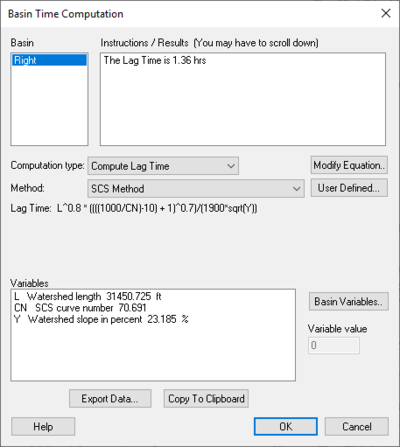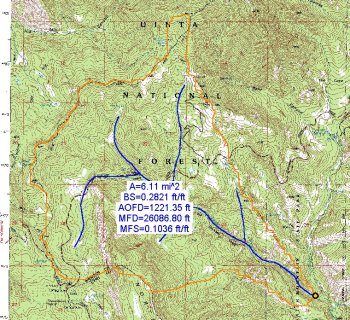WMS:Quick Tour - Travel Time Computations: Difference between revisions
From XMS Wiki
Jump to navigationJump to search
No edit summary |
No edit summary |
||
| (7 intermediate revisions by the same user not shown) | |||
| Line 2: | Line 2: | ||
With the first method, geometric parameters computed from a TIN or DEM are used in empirical equations developed for either time of concentration or lag time. Each sub-basin can use one equation. Coefficients and parameters used in the equation may be individually edited. All information used in computing the travel time may be saved in a text file or copied to the clipboard for documentation purposes. | With the first method, geometric parameters computed from a TIN or DEM are used in empirical equations developed for either time of concentration or lag time. Each sub-basin can use one equation. Coefficients and parameters used in the equation may be individually edited. All information used in computing the travel time may be saved in a text file or copied to the clipboard for documentation purposes. | ||
[[ | [[File:WMS Basin Time Computation.png|400 px]][[Image:geomparms.jpg]] | ||
{{WMSQuick}} | |||
[[WMS:Quick Tour - Join Tables| '''< Previous''']] | [[WMS:Quick Tour -Travel Time Computation| ''' Next >''']] | |||
[[WMS | [[Category:WMS Quick Tour|Travel]] | ||
Latest revision as of 16:28, 14 July 2020
WMS includes two different methods for computing travel times such as lag time and time of concentration.
With the first method, geometric parameters computed from a TIN or DEM are used in empirical equations developed for either time of concentration or lag time. Each sub-basin can use one equation. Coefficients and parameters used in the equation may be individually edited. All information used in computing the travel time may be saved in a text file or copied to the clipboard for documentation purposes.


